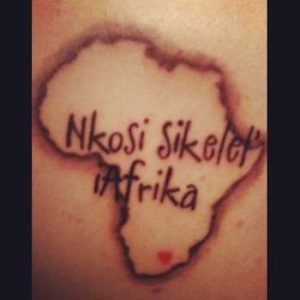
*"Nkosi Sikelel' iAfrika" ('Lord Bless Africa') is celebrated on this date in 1897.
This song became a pan-African liberation song, and versions of it were later adopted as the national anthems of five countries in Africa, including Zambia, Tanzania, Namibia, and Zimbabwe after independence and South Africa after the end of apartheid.
This is a Christian hymn originally composed by Enoch Sontonga, a Xhosa clergyman at a Methodist mission school near Johannesburg. Zimbabwe and Namibia have since adopted new compositions for their national anthems. The hymn has often been considered the unofficial African "national" anthem due to its reverence for the African continent and the hymn's use as liberation music.
According to anthropologist David Coplan: 'Nkosi Sikelel' iAfrika' has come to symbolize more than any other piece of expressive culture the struggle for African unity and liberation in South Africa." The song became more well-known after John Langalibalele Dube's Ohlange Institute choir used it. They played it at the South African Native National Congress (ANC) meeting in 1912. It was sung after the closing prayer, and the ANC adopted it as its official closing anthem in 1925. Seven additional Xhosa stanzas were added by the poet Samuel Mqhayi, published by the Lovedale Press in 1927.
Sontonga originally composed the hymn in B-flat major with a four-part harmony supporting a repetitive melody characteristic of "both Western hymn composition and indigenous South African melodies." In 1996, a shortened, combined version of the two compositions was released as the new national anthem of South Africa under the constitution of South Africa and was adopted the following year.
This version uses several of the official languages of South Africa. The first two lines of the first stanza are sung in Xhosa and the last two in Zulu. The second stanza is sung in Sesotho. The third stanza consists of a verbatim section of the former South African national anthem, "Die Stem van Suid-Afrika", and is sung in Afrikaans. The fourth and final stanza, sung in English, is a modified version of the closing lines of "Die Stem van Suid-Afrika."
